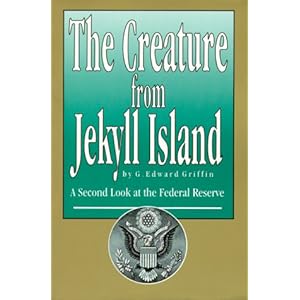 Link to Our Copy of The Creature from Jekyll Island: A Second Look at the Federal Reserve
Link to Our Copy of The Creature from Jekyll Island: A Second Look at the Federal Reserve
Just what is the Federal Reserve? It's actually a privately controlled system of private banks that decides the nation's money supply and interest rates, among other functions. As America continues to monetize its debt and flirt with a currency crisis, profound questions about who is doing this and why should be asked.
The author introduces the reader to the banking cabal that conjures our
privately controlled money supply out of thin air (so far, so good). He
then tries to push a paranoid, conspiratorial view of history in which mainstreet USA is being attacked by well-organized enemies. This elite is a true witches' brew: it's capitalist,
feudalist, communist, socialist, atheist, and based in Europe and New York
City.
Actual wonky details of the operations of the financial system, an intelligent discussion of why people might want a central bank (even if you disagree), and actual proof for multiple assertions are lacking in the book.
I can't really recommend this book. It's a poorly
researched, simple-minded, nativist vision of the world for people that don't
want real details - just a confirmation of their prejudices and beliefs.
I hope this is not your only introduction to the Federal Reserve.
However, I would recommend this book on the
history of money, as well as my review on the great Austrian economist
Ludwig von Mises if you want to understand a little more about money.



